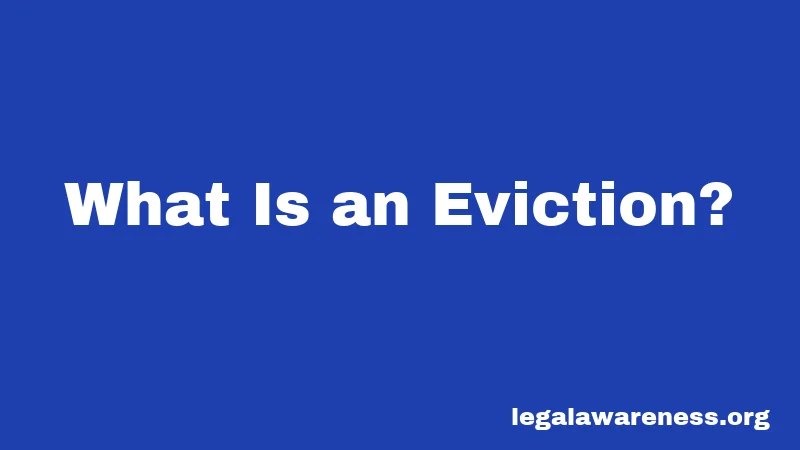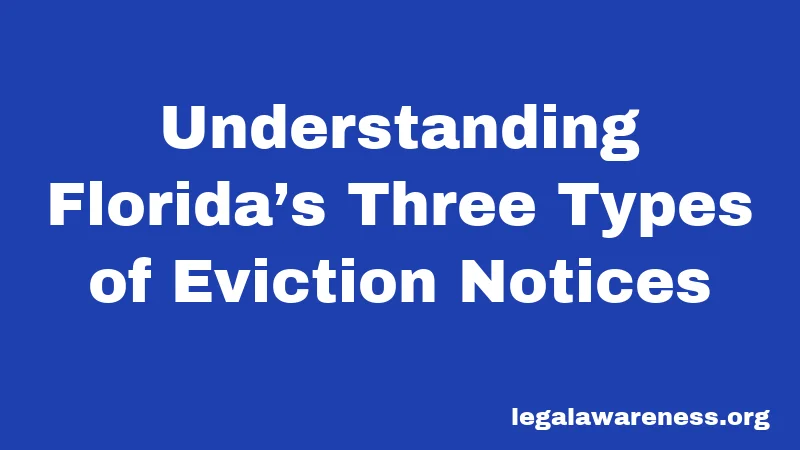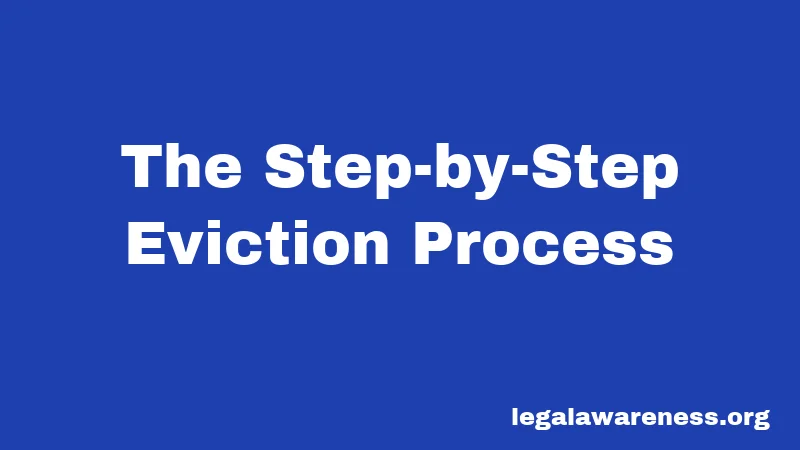Florida Eviction Laws in 2026: The Complete Breakdown
Most people have no idea how strict Florida’s eviction laws are. Seriously. Whether you’re a landlord trying to remove a tenant or a renter worried about losing your home, understanding these rules is crucial. The good news? We’ve got you covered. Let’s break down exactly what you need to know.
Florida updated its eviction laws significantly in 2025. These changes affect both landlords and tenants. Staying informed now can save you thousands of dollars and massive headaches down the road.
What Is an Eviction?

An eviction is the legal process where a landlord removes a tenant from a rental property. This isn’t something a landlord can do on their own. In Florida, every eviction must go through the court system. That’s the law.
Landlords can’t change the locks. They can’t shut off utilities. They can’t physically remove a tenant or their belongings. If they try, they’re breaking the law and could face serious penalties. Think of it like this: the court is the only referee allowed in this game.
Why Evictions Happen in Florida
Wondering what actually counts as grounds for eviction? Let me break it down.
Non-Payment of Rent
This is the most common reason. If a tenant doesn’t pay rent on time, the landlord can start the eviction process. Here’s the thing: Florida law doesn’t automatically give tenants a grace period. Rent is due on the date stated in the lease. Period. If your lease says rent is due on the first of the month, and it’s not paid by midnight that day, it’s technically late.
Lease Violations
Tenants have to follow the rules in their lease agreement. If someone breaks windows, tears up floors, or causes damage beyond normal wear and tear, that’s grounds for eviction. Same goes if they violate other lease terms, like having a pet when pets aren’t allowed or running a business from the apartment.
Unsafe or Illegal Activity
This one’s important. If a tenant uses the property for illegal activity—whether that’s running a drug operation, operating an unlicensed business, or anything criminal—the landlord can evict immediately. No second chances here. Same applies if the tenant creates safety hazards that make the place dangerous to live in.
Property Condition Issues
Tenants have to keep their rental units clean, safe, and livable. Creating fire risks, inviting infestations, or making the place unhygienic can trigger an eviction. The law requires them to maintain minimum housing standards.
Holdover After Lease Expires
If a lease ends and the tenant stays without signing a new agreement, the landlord can evict them. This applies even if the tenant pays rent. Technically, they become a tenant “at will” without a formal lease.
Understanding Florida’s Three Types of Eviction Notices

Here’s where things get super important. You need to serve the right notice for the right situation. Using the wrong notice can get your case thrown out of court. Seriously. Let’s talk about each one.
The 3-Day Notice to Pay or Quit
This is for non-payment of rent. You serve the tenant with a notice that says: “Pay the rent within 3 business days or vacate.” Those 3 days don’t include weekends or legal holidays. The notice must state the exact amount owed.
If the tenant pays within 3 business days, the eviction stops. The landlord can’t proceed to court. But if they don’t pay and don’t leave, the landlord can file an eviction lawsuit.
Here’s a key detail: if a landlord accepts rent during the eviction process, they might lose their right to continue. The court could rule that by accepting payment, they gave up their claim. So be careful if you’re collecting partial payments.
The 7-Day Notice to Cure or Quit
This notice applies to fixable lease violations. Examples include having a pet when pets aren’t allowed, running an unapproved business, or violating other lease terms that can be corrected.
The notice gives the tenant 7 days to fix the problem. If they fix it within those 7 days, the eviction stops. But if they don’t cure the violation, the landlord can file for eviction.
The 7-Day Unconditional Quit Notice
This is the serious one. Use this when a violation can’t be fixed or has been repeated. Illegal activity, severe property damage, or habitual violations fall here.
The difference? The tenant can’t cure it. They just have to leave within 7 days. No opportunity to make things right. No second chances.
New Changes in 2025 You Need to Know
Okay, pause. Read this carefully. Florida made some significant updates to its eviction laws starting in 2025. These changes affect how notices work and the timeline for evictions.
Email Notices Are Now Allowed (As of July 2025)
Here’s what’s new: House Bill 615 allows landlords and tenants to agree in writing to receive eviction notices by email. Previously, landlords had to deliver notices in person or by mail.
But there’s a catch. Both parties must consent first, usually through the lease agreement. The email must be transmitted with proof of delivery. If the email bounces, the landlord must try alternate delivery methods.
This only applies to notices like the 3-day and 7-day notices. Court documents (like the summons) still have to be delivered the traditional way.
Changes to Notice Periods
As of January 1, 2024, month-to-month tenants now have 30 days’ notice before the landlord can end the tenancy. That’s up from the previous 15 days. This gives renters more time to find a new place.
For year-to-year leases, landlords must give 60 days’ notice. Quarterly leases require 30 days. Week-to-week leases only need 7 days. These rules apply when there’s no specific cause—just a landlord wanting to end the tenancy.
Mandatory Mediation Requirement
Florida now requires landlords to attempt mediation before filing eviction paperwork in some cases. The goal is to resolve disputes without court costs.
But not all situations require mediation. If there’s criminal activity, serious property damage, or if mediation already failed recently, the landlord can skip straight to filing. This makes the process faster for serious violations.
The Step-by-Step Eviction Process

Let’s walk through what actually happens when an eviction moves forward. This timeline isn’t exact—it depends on court schedules and whether the tenant fights it. But here’s the general path.
Step 1: Serve the Notice
The landlord serves the appropriate notice (3-day, 7-day, etc.). This can be hand-delivered, mailed, or—with permission—emailed. The tenant has the specified time to pay, cure, or leave.
Step 2: File the Eviction Lawsuit
If the tenant doesn’t comply, the landlord files an eviction complaint in county court. They pay the filing fee. The court issues a summons.
Step 3: Tenant Receives Summons
The summons tells the tenant they’ve been sued. They have 5 days (excluding weekends and holidays) to file an answer with the court.
Step 4: Court Hearing
Both sides present their case to a judge. The landlord shows lease agreements, payment records, and proof that notices were served. The tenant can present defenses.
Step 5: Judge’s Decision
The judge rules in favor of either the landlord or tenant. If the landlord wins, the tenant gets a judgment for possession.
Step 6: The 24-Hour Window
Here’s a critical part most people miss. Once judgment is entered, the tenant has 24 hours to move out voluntarily. If they don’t leave, the landlord can request a Writ of Possession.
Step 7: Sheriff Physically Removes Tenant
Only the sheriff can physically remove someone from a property. The landlord can’t do it. A police officer can’t do it. Only the sheriff, with a Writ of Possession. This is the final, forcible step.
How Long Does an Eviction Actually Take?
Honestly, this varies wildly. Some evictions wrap up in a few weeks. Others drag on for months. It really depends.
If the tenant doesn’t contest the eviction, things move faster. An uncontested case could be done in 3-4 weeks. But if the tenant fights it, gets an attorney, or appeals, you’re looking at several months.
Court backlog matters too. If the court is busy, cases move slower. Holidays also add time. Those 3 business days in the notice? Weekends and holidays don’t count.
Generally, plan for at least 4-8 weeks from notice to physical removal. Some cases take much longer.
What Happens If a Landlord Breaks These Rules?
This is important. Self-help evictions are illegal in Florida. Completely illegal. And the penalties are harsh.
If a landlord tries to change locks, shut off utilities, or remove belongings without a court order, they’re committing a crime. The tenant can sue for damages. And here’s the kicker: tenants can recover up to three times the actual damages under Florida’s tenant protection laws.
So if a landlord illegally locks out a tenant and causes $5,000 in damages, the tenant could win a court judgment for $15,000. Plus attorney’s fees. Plus emotional distress damages.
Courts take this seriously. Don’t do it. Ever. Not even if you’re frustrated. Not even if you think the tenant deserves it. Go through the court system.
Tenant Protections and Defenses
Tenants have real legal protections in Florida. You should know about these whether you’re a tenant or landlord.
Retaliation Is Illegal
A landlord can’t evict a tenant in retaliation for reporting code violations, calling the health department, or requesting repairs. If a tenant reports problems and then gets evicted within 90 days, Florida presumes it’s retaliation. The burden shifts to the landlord to prove otherwise.
Discrimination Is Illegal
Landlords can’t evict based on race, color, religion, national origin, family status, disability, or sex. These are protected classes. If a tenant believes they’re being discriminated against, they can fight the eviction or file a separate complaint.
Uninhabitable Conditions
If a rental unit isn’t habitable—no working plumbing, broken heating in winter, major safety hazards—tenants have defenses. They might be able to withhold rent or break the lease without penalties.
Improper Notice
If the landlord didn’t serve the notice correctly, the eviction case could be dismissed. The notice has to be detailed, accurate, and delivered properly. Mistakes here are costly.
Local Rules and Special Circumstances
Here’s something most people don’t realize: some Florida cities and counties have their own rules.
Miami-Dade County, for example, requires 60 days’ notice before rent increases over 5%. Royal Palm Beach has similar rules. These are about notification, not limiting how much rent can increase. But they’re still the law in those areas.
Military service members have federal protections under the Servicemembers Civil Relief Act (SCRA). A tenant on active duty can’t be evicted for non-payment without a court order. This applies even if they’re behind on rent.
Tenants with disabilities might have rights under the Fair Housing Act. They could request reasonable accommodations.
Always check your specific county’s rules. What’s legal in one county might be different in another.
The Cost of Evictions
Let’s be real. Evictions are expensive.
Court filing fees alone can run $200-$400. If you hire an attorney—which many landlords do—you’re looking at attorney fees that could be $1,000-$5,000 or more. Sheriff’s fees for physically removing the tenant add another $100-$300.
Beyond those direct costs, there’s lost rent. If an eviction takes 2-3 months and the unit sits empty during court, that’s months of rent income gone. Repair and cleaning costs can be significant too.
Total cost? Often $3,000-$10,000 when you add everything up. That’s why prevention matters so much.
Preventing Evictions: What You Can Do
Stay with me here. Evictions suck for everyone. They’re expensive. They’re stressful. They damage relationships. Here’s how to prevent them.
For Landlords
Screen tenants carefully. Check references, credit, and rental history. Background checks catch past evictions. Problem tenants usually have a pattern.
Maintain the property. Handle repairs quickly. Tenants are less likely to skip rent if the unit is nice. Keep systems working—heating, plumbing, electrical.
Communicate clearly. Use written agreements. Be specific about rent due dates, late fees, and house rules. Clarity prevents disputes.
Consider mediation if problems start. Address issues early. It’s cheaper than eviction.
For Tenants
Pay rent on time. Set up automatic payments. No excuses, no exceptions. This is your number one protection.
Keep the unit in good condition. Document the condition when you move in. Take photos. Report maintenance issues in writing.
Know your lease. Read it carefully. Understand the rules. Follow them.
Communicate with your landlord. If you’re going to be late on rent, give notice. Work out solutions. Many landlords prefer this to eviction.
New Commercial Eviction Laws (2025)
Quick note for commercial landlords: Florida passed new laws making it faster to remove unauthorized occupants from commercial properties and hotels.
Senate Bill 322 (effective July 1, 2025) lets commercial property owners file a complaint directly with the sheriff instead of going through full court proceedings. This is faster, but there are penalties for wrongful removal.
Senate Bill 606 (effective July 1, 2026) updates hotel guest removal procedures. Hotels now require specific notice, and refusing to leave becomes a second-degree misdemeanor.
Residential landlords still must follow the traditional court process. These new laws are specifically for commercial properties and hotels.
Frequently Asked Questions
Can a landlord evict a tenant without going to court?
No. All residential evictions in Florida must go through the court system. Landlords cannot use shortcuts like changing locks or removing belongings without a court order and sheriff involvement.
How much notice must a landlord give to end a month-to-month lease?
30 days’ written notice, as of January 1, 2024. This applies to month-to-month tenancies. For year-to-year leases, it’s 60 days. The notice must be given before the rental period ends.
Can a landlord evict without a specific reason?
Yes, for month-to-month and week-to-week leases without a signed lease agreement. But for fixed-term leases, the landlord must have legal cause. The landlord still needs to provide proper notice.
What if a tenant pays after the 3-day notice expires?
Depends on when they pay. If they pay before the 3 days are up, the eviction stops. If they pay after the 3 days but before the landlord files in court, it might stop the case. Once a lawsuit is filed, the situation becomes more complicated.
Can an eviction be appealed?
Yes. A tenant can appeal the eviction judgment to a higher court. However, they typically must post a bond to stay in the property during the appeal process. An attorney should handle appeals—the process is complex.
Final Thoughts
Florida’s eviction laws are detailed and strict. Both landlords and tenants need to understand them. Landlords need to follow procedures exactly or their cases get dismissed. Tenants need to know their rights and protections.
Here’s the bottom line: follow the law. If you’re a landlord, don’t take shortcuts. Go through the court. If you’re a tenant, pay rent, keep the place clean, and follow your lease. Most evictions are preventable.
When in doubt, consult a Florida attorney who specializes in landlord-tenant law. The money spent on legal advice now saves thousands later. Stay informed, know your rights, and when you need help, ask for it.
References
Florida Statutes Chapter 83 – Residential Tenancies
Florida Courts – Self-Help Center for Evictions
Florida Department of Business and Professional Regulation – Landlord and Tenant Law
Senate Bill 615 – Electronic Notice Delivery (July 2025)
